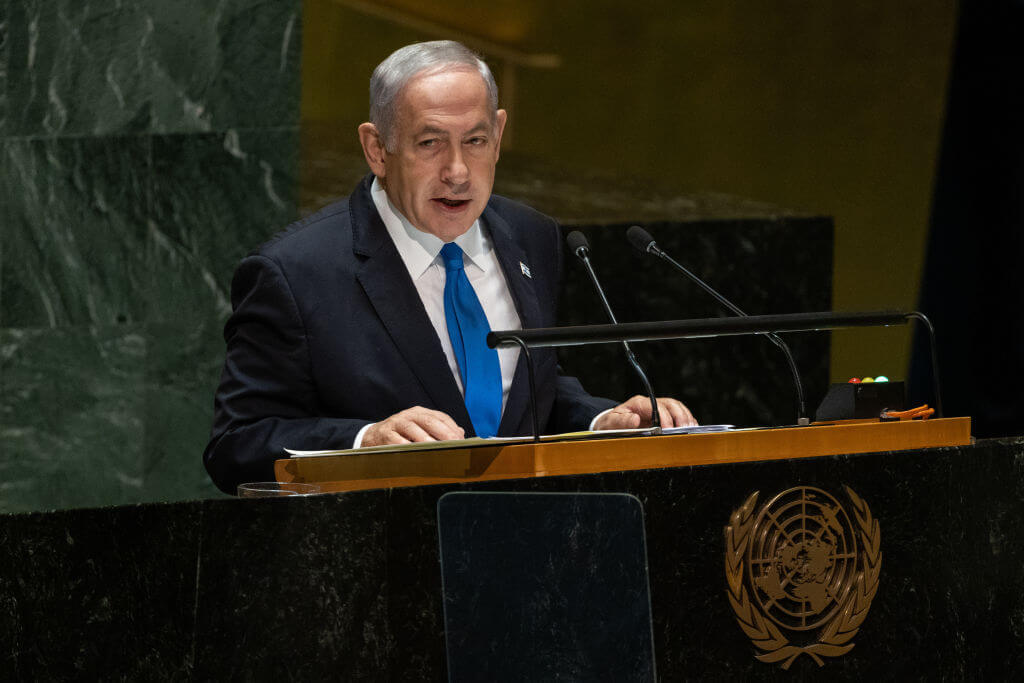A Moderate in America, With No Political Party To Call Home
I propose importing Kadima, Israel’s new centrist party, to the United States.
I don’t mean that we need yet another Jewish organization; quite the contrary. Instead I am plugging an excellent observation first sketched by Jonathan Rauch in the March issue of the Atlantic Monthly.
In his essay, Rauch argues that American politics is broken the way Israeli and Japanese politics were before Ariel Sharon and Junichiro Koizumi transformed politics in their countries, and is similarly in drastic need of a fix. In the United States, he points out, we currently have no majority party, the two main parties each speak for about a third of the country, and each party’s third of the electorate is either well to the right or the left of the remaining third in the middle.
The result, Rauch writes, is that “[n]either party can govern except in coalition with independent voters, most of them moderates and many of them dismayed.” As in Israel with the old Likud and Labor, these centrists have disengaged from President Bush but have not engaged with the Democrats. The center, in short, has no political party it can call home.
Part of the reason Democrats can’t connect with the disaffected center is the angry, take-no-prisoners tone dominating the left wing of the party. Primary challenges to party moderates, like the one launched against Senator Joseph Lieberman, are bad enough. Even worse is the ill-considered drive by Senator Russell Feingold to censure President Bush.
According to a Wall Street Journal/NBC News poll released March 16, while the president’s approval numbers are way down, Democrats haven’t picked up many of the newly disaffected. Democrats drew a positive rating from just 32% of Americans, against a 37% negative one. By way of comparison, Republicans got a 34% positive rating and 43% negative. Most significantly, according to the summary of the poll published in the Wall Street Journal, “Among political independents, negative views of the Democratic Party outweigh positive views by 38%-22%.”
Moreover, Bush is dropping because things in Iraq appear to be going so badly, while the poll showed that his ratings soared on other matters. In fact, a “majorit[y] express[ed] support for his… warrantless wiretaps by the National Security Agency” — precisely the issue over which Sen. Feingold proposes to censure the president.
A Kadima-style development is unlikely to occur here. I can’t think of a single politician prepared, or able, to contemplate wrecking his or her own party base and rolling the dice the way Sharon did a few months ago. Moreover, better to do it, if at all, from the perch of high office, as Sharon did. What’s more, the United States doesn’t face a defining crisis in the way that Israel does. That is, the Palestinian question looms so large that other fault lines — economic, social, religious — pale in significance. Since the September 11 attacks, the war on terrorism may play a similar role, but the recent fight over the Dubai Ports deal illustrates how quickly one side can turn the other’s advantage against it.
Kadima is centrist in a peculiarly Israeli way. While combining a right-left punch, Kadima does not triangulate its positions between Likud and Labor. Rather, it gives expression to a third way of thinking, combining the cumulative experience of disenchanted alumni from both the school of peacemaking illusions and the school obsessed with hanging on to every inch of the West Bank.
From this vantage point, disaffected American centrists have a major set of needs that are unsuccessfully addressed by both major parties. The party that champions moral seriousness at home is, on its left fringe and in its worst moments, unserious about the dangers in the world. On the other side, the party that is serious about dangers abroad displays little moral seriousness about economic and social problems at home — with the exception of the abortion issue, on which its views are considered wrong by many moderates.
That, in short, is how American politics are broken: the absence of a party firmly committed to social justice and robust, fiscally responsible use of government at home, along with wise and prudent projection of American military might abroad.
Instead, what we have are studies in contradiction. The people fighting Islamic fascism in Iraq were the same one approving the Dubai Ports deal. Meanwhile, the folks who have been denouncing racial profiling of Arabs and Muslims since 9/11 — see, for example, Al Gore’s awful apology on this score to a room full of Saudi dignitaries at the 2006 Jeddah Economic Forum — were among the first to rush into racially profiling a company solely on the basis of its Arab connection.
Assuming Kadima forms the next Israeli government following next week’s elections, it will face similar problems as it forms a coalition. All post-election deals require compromise on some of the axes that define national politics. Democrats and Republicans, however, are forced into making such compromises before the election — say between party stalwarts who turn out for primaries and potential voters in the general election. The larger pool of potentials include centrists, or as they are called in American pollster lexicon, independents.
Can anyone find a way to offer those independents a political home? It is unlikely to happen anytime soon, both because of the absence of a compelling crisis around which to rally, and the lack of a political personality with the stature of Sharon, or Teddy Roosevelt, or Charles De Gaulle.
Most polls indicate that, except on the issue of fighting terrorism, Bush has lost the independents. They also show that Democrats have not claimed them.
That large group of voters could flock to the banner of a popular candidate, should one emerge. If a “Bull Moose”-type bid for the White House proved successful, the new president could figure what colors to put on his banner after moving into 1600 Pennsylvania Avenue.
This is unlikely to happen any time soon, but Rauch is surely right that whichever party figures out how to claim the center while retaining its own moderates “will be the country’s majority party, possibly for years to come.”
David Twersky is director of international affairs of the American Jewish Congress.
A message from our CEO & publisher Rachel Fishman Feddersen

I hope you appreciated this article. Before you go, I’d like to ask you to please support the Forward’s award-winning, nonprofit journalism during this critical time.
We’ve set a goal to raise $260,000 by December 31. That’s an ambitious goal, but one that will give us the resources we need to invest in the high quality news, opinion, analysis and cultural coverage that isn’t available anywhere else.
If you feel inspired to make an impact, now is the time to give something back. Join us as a member at your most generous level.
— Rachel Fishman Feddersen, Publisher and CEO






















